Nobel Prize laureates gathered to present their research and discuss the future of science at the "Nobel Prize Dialogue Tokyo 2025," held in Yokohama City. This year's subtitle was "The Future of Life: Advanced Technology and Our Path Forward." Researchers discussed a wide range of topics including the relationship between humanity and science, advances in genetic technology, computers, and generative AI (artificial intelligence). (Years and fields of Nobel Prize awards are shown in parentheses.)
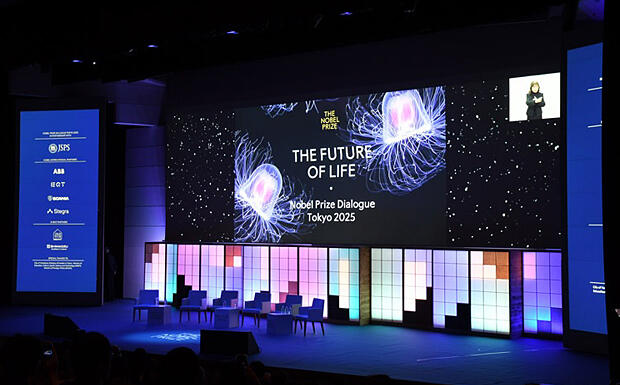
(March 2025, PACIFICO Yokohama, Yokohama City)
The event was co-hosted by the Nobel Foundation of Sweden and the Japan Society for the Promotion of Science.
What Distinguishes Humans from Robots?
First, to trace human history, Dr. Svante Pääbo (2022, Physiology or Medicine) gave a presentation based on his research on why Neanderthals became extinct and how they differed from modern humans. Pääbo analyzes the genomes of 40,000-50,000-year-old bones to study Neanderthal-specific DNA.
According to Pääbo, some parts of the Neanderthal genome have been passed down to modern humans. However, modern humans spread throughout the world, increased in population, and developed culture and technology, while Neanderthals became extinct.
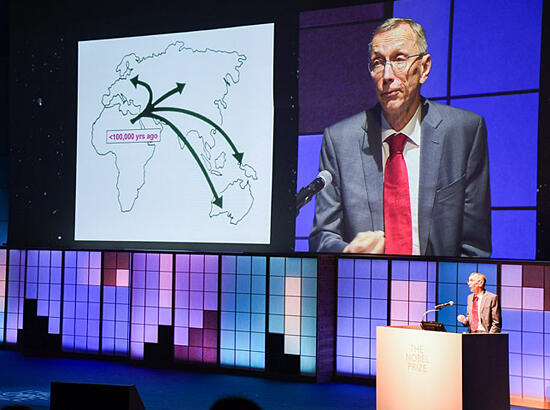
(March 2025, PACIFICO Yokohama, Yokohama City)
Following this prologue lecture on the possibility that humans could also face "extinction," researchers discussed the relationship between humans and robots.
Dr. Richard Roberts (1993, Physiology or Medicine) pointed out that Africa, the birthplace of humans, is home to many animals, and what separates these animals from humans is the "brain." Relating to the symposium's theme of advanced technology, he raised the question: "Can robots have insight or formulate questions? Do they have curiosity?"
Building on this, Dr. Juichi Yamagiwa, primatologist and former President of Kyoto University, asked, "When gorillas and humans communicate, we can understand each other through attitudes and facial expressions. Can robots convey ambiguity or engage in emotional conversations?" Gorillas are known to sometimes demonstrate surprisingly high intelligence.
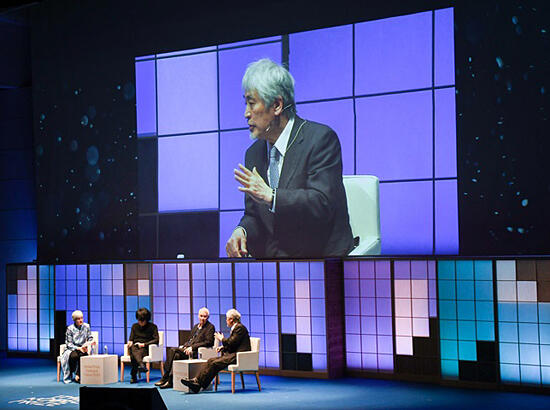
(on screen, chair furthest to the right, March 2025, PACIFICO Yokohama, Yokohama City)
Responding to these questions was robotics scientist Professor Hiroshi Ishiguro at the Graduate School of Engineering Science, the University of Osaka, who is exhibiting an android pavilion at the Expo 2025 Osaka, Kansai. Ishiguro acknowledged that such sophisticated interactions are currently difficult. He added, "You can tell whether it's a robot through conversation. A robot can manage short conversations, but during longer ones, you'll realize it's not human," while projecting that "natural conversations should be possible in 20-30 years."

(March 2025, PACIFICO Yokohama, Yokohama City)
Roberts pushed further, asking, "As humans became smarter, they became more creative. Instead of just gathering fruits, they developed agriculture. Can robots do agriculture?" He continued, "Who will control robots? Will robots help us? For example, scientists can disagree with each other but still talk without killing one another. We must ensure AI isn't used in the wrong direction. If there's authoritarianism in the programming, it must be removed. It's crucial not to input misinformation and to ask the right questions," sounding a warning about the use of scientific technology.
In subsequent sessions, researchers repeatedly emphasized that AI and quantum computers should incorporate information that respects privacy, accurate research data, and human rights considerations.
Expectations for education: See through truth beyond social media
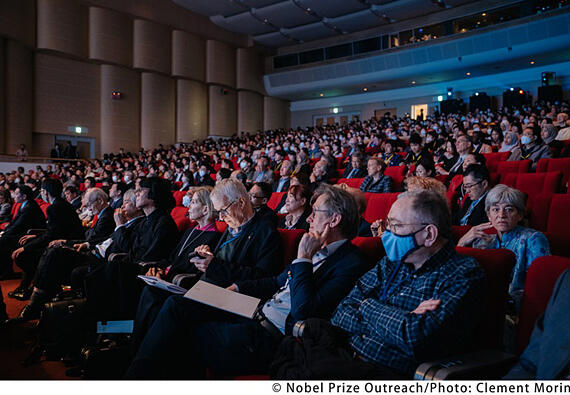
(March 2025, PACIFICO Yokohama, Yokohama City)
Next, participants discussed how to deal with the rampant fake news and pseudoscience, focusing on the theme of "future."
Roberts shared a past example: "GMOs (genetically modified organisms) can improve yield and nutrition, but when Monsanto (now acquired by Bayer) tried to introduce GMOs in Europe, Greenpeace, an environmental group, claimed they were 'dangerous.' When there was opposition, donations flowed to organizations, and propaganda even spread in Hollywood." Professor Joseph Ecker at the Salk Institute, sighed in agreement, saying, "The benefits of technology aren't being communicated." Greenpeace campaigns against GMOs, claiming they pose numerous dangers and should be banned.
As a solution, perspectives from beyond pure science were offered. Distinguished Professor Shunsuke Managi at Kyushu University, an economist, stated, "People who view something as risky don't change their minds even with increased knowledge. We now know that fake news spreads faster than real news. From a behavioral science perspective, the starting point [of correct information] is crucial."
Roberts remarked, "People crave education, but social media is trying to take over education. Science wants to counter [opposition movements] but lacks funding. 197 Nobel laureates have signed a statement that GMO is good technology." Dr. Managi suggested, "Even if scientists lack the ability to deliver messages on social media, they should utilize the power of organizations like the United Nations."
Ecker noted, "If it saves children, I support it. For example, no one would say 'I won't give insulin injections because they're genetically modified'," while emphasizing, "We need to not only declare that something is scientifically excellent but also accept others' opinions," showing a willingness to find middle ground.
Keep the spirit of a 5-year-old and take on challenges without fear
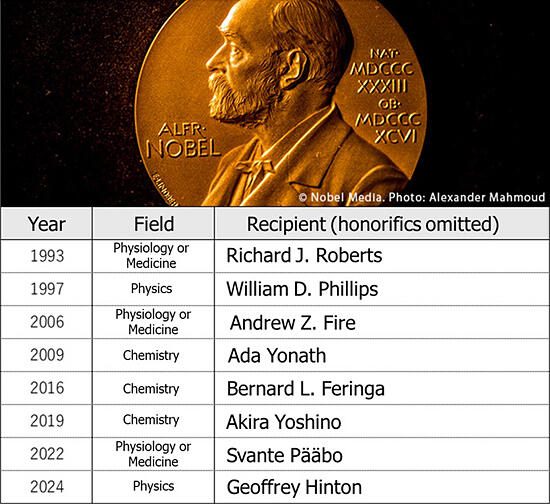
In the final session, five Nobel laureates—Dr. Bernard Feringa (2016, Chemistry), Dr. Ada Yonath (2009, Chemistry), Dr. Andrew Fire (2006, Physiology or Medicine), Dr. William D. Phillips (1997, Physics), and Dr. Richard Roberts—gathered to share their impressions of the day and messages for the attending researchers.
Feringa began: "Talking with young researchers gave me energy. We discussed career paths, which clarified my reasons for being at a university. It was refreshing." Fire added, "Doing research means you can become a leader who contributes to the community. We don't do research because someone tells us to. I thank young researchers in advance because I believe they will create a better world," bowing his head in appreciation.
Phillips continued, "You might think Nobel laureates are special scientists. That's not true. Certainly, some are—like Schrödinger, Einstein, Heisenberg... But you don't need to be like them. Creativity can emerge in any environment. Learning something new is valuable," suggesting that opportunities exist for all researchers.
As advice for continuing research, Roberts said, "It's okay not to succeed because you can think about why you failed. When students come to me and say, 'it didn't work,' that's a very happy moment for me. I myself didn't like being told what to do. If you think something is wrong, consider the right direction." Dr. Yonath also called out in a slow, deliberate tone, "When I was young, I wondered why and how nature works this way. Think about why it is so, why it works in this direction."
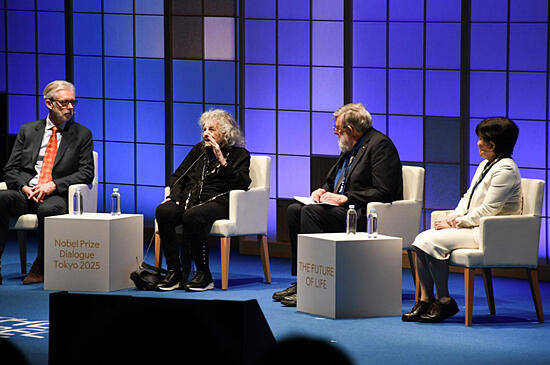
(March 2025, PACIFICO Yokohama, Yokohama City)
Then Dr. Phillips suddenly stood up and said, "When I bring liquid nitrogen to kindergarten and spill it, smoke appears, and they're really surprised," making a dramatic gesture of surprise, and concluded, "Don't forget that 5-year-old spirit," which was met with thunderous applause from the audience.
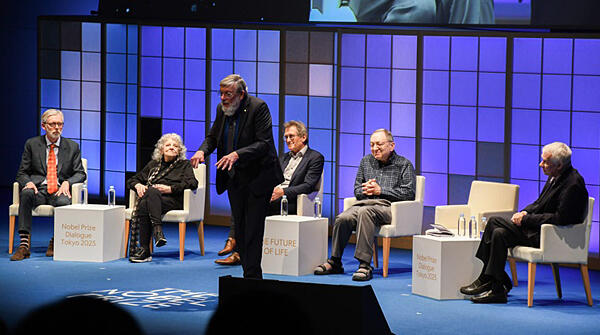
(March 2025, PACIFICO Yokohama, Yokohama City)
"Our path forward" will depend on how we handle AI, which can be both poison and medicine—making fakes appear real while also providing benefits. Indeed, AI-related research was awarded the Nobel Prize in 2024.
While Nobel Prize scientists might seem intimidating and serious, I left the venue with a warm feeling, having discovered that they are actually quite humorous and charming.
(TAKIYAMA Nobuyo / Science Portal Editorial Office)
Original article was provided by the Science Portal and has been translated by Science Japan.




